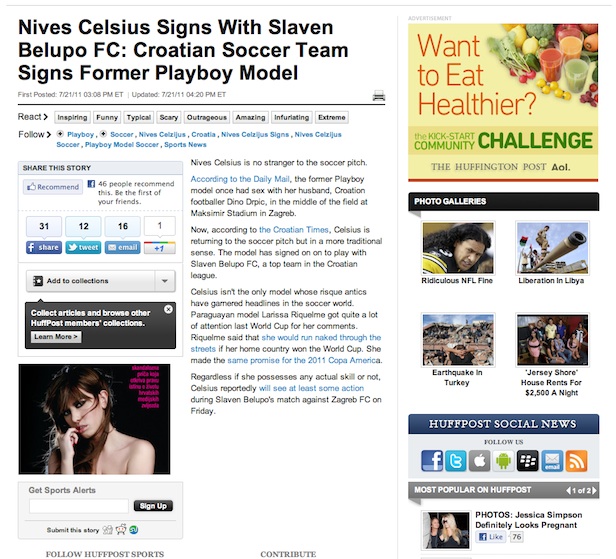Should You Have To Pay To Link?
Central European News Apparently Thinks So
First, we aren’t talking about links you pay for in relation to search here. This discussion is about paying a publication to link to their web content – as if you are purchasing the right to re-publish it.
Central European News (CEN) is an online media company that publishes news, images, research, and more to a range of other media outlets for a fee.
PressGazette’s Andrew Pugh ran an interesting story about the The Huffington Post linking to sources like The Daily Mail, which had paid for content from CEN. CEN decided to send payment invoices to The Huffington Post, and they were paid for by the Huffington Post. CEN then encouraged other content providers to follow their lead, and send invoices to the Huffington Post as well. The concept here is that other publications would be compensated for The Huffington Post linking to them.
Interesting position for sure, but the problem is that The Huffington Post didn’t mean to pay the invoice, as was revealed in a followup to Pugh’s original post. They use CEN as one of their photo providers, and do pay for those services, so mistook these invoices as being related to that. So anyone who wishes to bill the Huffington Post for linking to their content might think twice about the probability that they’ll actually receive payment.
The real question here is: should The Huffington Post (or any other site/blog) have to pay the creator of original content to link to their content?
Keep in mind that the The Huffington Post LINKED to the content, as opposed to publishing it. It’s a link referencing the content…not a copy of the full article.
According to the logic expressed by CEN it’s a violation of copyright if a publication even uses the original content as a starting point. So, by this logic, for example, if Publication A was the first to report on Occupy Wall Street protesters clashing with police in Atlanta, it would then be a violation for publications B, C, D, and E, to report that Publication A was the outlet reporting this news. Publication B could not say, “Publication A is reporting that police have confronted protesters in Atlanta, but we have yet to confirm this.”
So, if one publication was able to get a source of their own with that information, but nobody else was able to, publications B, C, D, E, etc. would not even be able to mention that one publication was reporting on the event. The world would have to already be reading publication A to even know about the death, or at least reading publication G, H, or I, which are paying a fee to Publication A for the rights to reprint.
Nevermind that it’s entirely possible that Publication A is not even a service that charges publications for reprints, because it’s entirely possible that Publication A could be a simple blog, or even somebody’s Facebook account. News is not just reported by traditional means anymore. That’s just the reality of today’s Internet.
Let’s look at one of the Huffington Post examples referenced in Pugh’s piece:
You can see that while the piece is not an incredibly lengthy, in depth piece, it does link to five different pages to pull together its story. This is in and of itself an indication that the piece is not a total rewrite of one article, but is drawing on references from various sources (including the Huffington Post’s own content). If you actually click through to those other articles, you can also see that this is not a straight re-write of any one piece.
As often as the law (at least in this country) has ruled on the side of “fair use”, it’s hard to believe The Huffington Post is legally in the wrong here, though I’m certainly not a lawyer, and CEN is obviously not based in the U.S.
It seems like CEN wants people to pay to link to their content, but if you’re paying, why wouldn’t you just post the whole article?
And of course CEN would by extension need to pay for their OWN links to other content. Either way, to impede linking would create a dangerous precedent. If websites are required to pay every time they want to reference a piece of information, it’s bound to not only create more situations where web content providers simply go uncredited, but it’s also likely to stifle a lot of valuable content from being created in the first place.
If one publication has information that is indeed first-hand news, or shares some insight that has not previously expressed, but only makes sense in the context of another piece of information that has already been published by a different publication, they need to reference that piece. It simply doesn’t make sense to have to pay to point to freely available information, in my own humble opinion. But you may disagree. That’s just the way the web works. The web is based on links. Without links, it’s not a “web”.
While the HuffPost piece in question is not some hugely important piece of web content, who decides where the line is?


Leave a Reply
You must be logged in to post a comment.